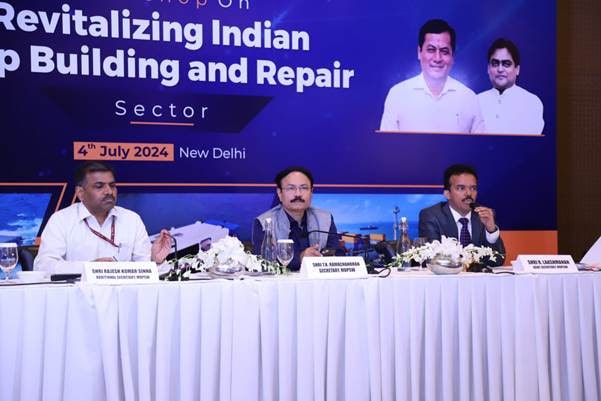

The Ministry of Ports, Shipping, and Waterways (MoPSW) successfully organized a pivotal workshop on the Revitalizing Indian Ship Building Industry, chaired by the Secretary, Ministry of Ports, Shipping and Waterways (MoPSW), Shri TK Ramachandran.
The event brought together key stakeholders, representatives from various government ministries, departments, shipping operators and PSU/ private sector shipyards to discuss strategies for revitalizing the shipbuilding and repair ecosystem within India and aligning it with India's ambitious Maritime India Vision 2030 (MIV 2030) and Amrit Kaal Vision 2047.
This was on Thursday.
‘’Under the leadership of Hon’ble Prime Minister, India is set to become a global economic superpower, with a robust maritime sector playing a crucial role in this journey. Atma Nirbharta emphasize self-reliance, extending to the shipping and shipbuilding industries. Despite efforts and developments in port infrastructure and inland waterways, we remain dependent on foreign vessels and have yet to capture a significant share of the global shipbuilding market.
Recognizing this, the Ministry is now focusing on enhancing our shipbuilding, and ship repair infrastructure to meet the ambitious goals of MIV 2030 and MAKV 2047. Through this interactive workshop, MoPSW aims to present specific policies based on stakeholder inputs and invite further valuable contributions to drive demand and capacity growth in these sectors’, Shri TK Ramachandran, Secretary of MoPSW.
The presentation made by the Ministry highlighted the growing trend of the Indian overseas and coastal cargo, while at the same time highlighting that the share of the cargo carried by Indian owned/ flagged vessels has been dropping over the past decade and presently stand at only about 5.4%. If there is no initiative undertaken, then this share may fall further, resulting in Indian owned/ Indian built ships having no play even in India’s own shipping market.
Furthermore, owning of the fleet needed for national trade brings with it several key advantages in terms of availability of fleet in times of crisis, protection against embargos and protection of India’s valuable foreign exchange reserves which is presently being spent on chartering and freight management charges to foreign nations.
At the same, time, if the tremendous demand stemming from the needs of the Indian shipping market are adequately targeted by Indian shipyards, it may result in an opportunity to the extent of over USD 237 billion (~INR 20 lakh crores) by 2047.
The workshop was attended by more than 100 participants from 50 organisations including various government ministries, departments, shipping operators and PSU/ private sector shipyards. Viz., Ministry of Defence; Ministry of Coal; DG Shipping, Shipyards Association of India; National Centre of Excellence in Green Port and Shipping; Royal IHC Netherland; HPCL; Indian Oil Corporation Limited; GAIL; Garden Reach Shipyard; Indian National Ship Owners’ Association; Hindustan Shipyard Limited; Ministry of Petrol and Natural Gas; Dredging Corporation of India Limited etc.
The idea of the event was to bring the demand generators and the suppliers/builders onto a collaborative common platform to formulate ideas to ensure that the large demand from the Indian shipping industry may become opportunities for the Indian shipbuilding industry.
In the event, the stakeholders deliberated upon the limitations of Indian shipyards, the incentives needed, both on supply and demand sides and the assistance that could be provided by the MoPSW to facilitate the same. The inputs and insights that have been received from the distinguished voices of the Industry were noted and the Ministry hopes to address the various issues that were raised, incorporate them into their 100 days agenda and suitably help develop and nurture the ecosystem and achieve the ambitious targets of MIV 2030, of making India one of the top 10 ship building nations by 2030, and one of the top 5 countries in shipbuilding by 2047.
In the past, MoPSW has endeavored to aid the growth of shipbuilding and ship repair industry through schemes such as Shipbuilding Financial Assistant Policy, Right of First Refusal (ROFR) policy, according Infrastructure status to shipyards, etc. Despite these measures, commercial shipbuilding in India, has still not reached a position of strength compared to global shipbuilding majors, accounting for less than 1% of the global shipbuilding market, largely on account of lack of demand. Consequently, MoPSW is examining the policy measures to strengthen demand creation domestically given our requirement to strengthen our domestic fleets.
Notable advancements made in the development of indigenous low-emission or zero-emission ships/vessels by Indian shipbuilding companies showcase our potential to lead the world in safe sustainable and green shipbuilding. MoPSW is working on an integrated approach to bringing together shipbuilding stakeholders through the development of Maritime Clusters.
Aligning with the Maritime India Vision 2030 (MIV 2030) and the Amrit Kaal Vision 2047, the workshop emphasized the importance of these visionary frameworks in driving India's maritime growth. MIV 2030 has set a bold target to elevate India's global ranking in shipbuilding and ship repair from over 20th place to the top 10 and an ambitious goal has been set for the top 5 position, as outlined in the Amrit Kaal Vision 2047. Another major target under MAKV 2047 is handling 1300 MMTPA of coastal cargo carriage and greater proportion of Indian overseas cargo to be carried out on Indian owned/ Indian built ships. To achieve these targets MoPSW seeks to Develop capabilities and evolve sector to global competence; Adopt global best practices, processes and technologies foreign; Protect exchange reserves; Drive Industry sustainability and green initiatives; Expand shipbuilding capacity.
This strategic vision reflects the government's commitment to transforming India into a global maritime powerhouse. This ambitious goal is part of a comprehensive strategy to enhance the country's maritime infrastructure and capabilities.